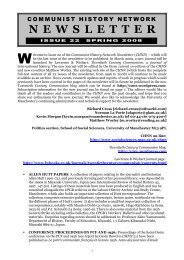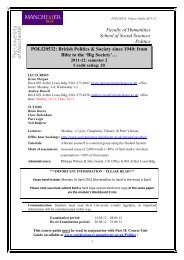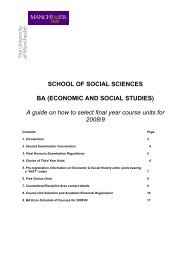second year course outlines 2012-2013 - School of Social Sciences ...
second year course outlines 2012-2013 - School of Social Sciences ...
second year course outlines 2012-2013 - School of Social Sciences ...
Create successful ePaper yourself
Turn your PDF publications into a flip-book with our unique Google optimized e-Paper software.
Original sources<br />
Goodman, N. 1979. ‘The new riddle <strong>of</strong> induction’, in his Fact, Fiction, and Forecast<br />
(Cambridge, MA: Harvard University Press. [On Blackboard site.]<br />
Lipton, P. 2007. ‘The ravens revisited’, Royal Institute <strong>of</strong> Philosophy Supplement, 61: 75-95.<br />
Swinburne, R. 1971. ‘The paradoxes <strong>of</strong> confirmation: a survey’, American Philosophical<br />
Quarterly, 8: 318-30.<br />
Textbooks/encyclopedia entries<br />
Vickers <strong>2012</strong> (see Week 3), §5<br />
See §5 <strong>of</strong> the reading list on the Blackboard site for lots more suggestions.<br />
Week 5: Falsificationism<br />
Original sources<br />
Popper, K. R. 1972. Objective Knowledge: An Evolutionary Approach (Oxford: OUP), Ch.1<br />
[on Blackboard site] and Ch.3 (‘Epistemology without a knowing subject’).<br />
Schilpp, P. A. 1974 (ed.) The Philosophy <strong>of</strong> Karl Popper, 2 vols. Lots <strong>of</strong> papers discussing<br />
Popper’s view; see especially those by Maxwell, Putnam and Levison (in Book 1).<br />
Textbooks/encyclopedia entries<br />
Ladyman 2002, §§3.2-3.6.<br />
Thornton, S. 2011. ‘Karl Popper’, The Stanford Encyclopedia <strong>of</strong> Philosophy (Winter 2011<br />
Edition), ed. E. N. Zalta, plato.stanford.edu/archives/win2011/entries/popper/<br />
See §2 <strong>of</strong> the reading list on the Blackboard site for lots more suggestions.<br />
Week 6: Scientific revolutions<br />
Original sources<br />
Hacking, I. 1981. (ed.) Scientific Revolutions (Oxford: OUP)<br />
Kuhn, T. S. 1962. The Structure <strong>of</strong> Scientific Revolutions (any edition). [Excepts to appear<br />
on the Blackboard site in due <strong>course</strong>]<br />
Kuhn, T. S. 1990. ‘The road since Structure, Proceedings <strong>of</strong> the Biennial Meeting <strong>of</strong> the<br />
Philosophy <strong>of</strong> Science Association, 1990: 3-13.<br />
Lakatos, I. & Musgrave, A. 1970 (eds.) Criticism and the Growth <strong>of</strong> Knowledge (Cambridge:<br />
CUP)<br />
Textbooks/encyclopedia entries<br />
Nickles, T. 2011. ‘Scientific revolutions’, The Stanford Encyclopedia <strong>of</strong> Philosophy (Spring<br />
2011 Edition), ed. E. N. Zalta, plato.stanford.edu/archives/spr2011/entries/scientificrevolutions/<br />
Oberheim, E. & Hoyningen-Huene, P. <strong>2012</strong>. ‘The incommensurability <strong>of</strong> scientific theories’,<br />
The Stanford Encyclopedia <strong>of</strong> Philosophy (Summer <strong>2012</strong> Edition), ed. E. N. Zalta,<br />
plato.stanford.edu/archives/sum<strong>2012</strong>/entries/incommensurability/<br />
Ladyman 2002, Ch.4.<br />
Bird, A. 2000. Thomas Kuhn (Chesham: Acumen)<br />
132

















